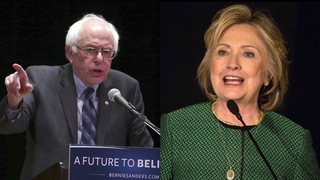
During Thursday night’s Democratic presidential debate, Hillary Clinton questioned Bernie Sanders’ judgment and how prepared he is to be president, citing his recent interview with the New York Daily News editorial board. Clinton said Sanders had trouble “answering questions,” including one about his core issue, breaking up the banks. But is that true? Daily News columnist Juan González took part in the paper’s interviews with both Sanders and Clinton.
Transcript
AMY GOODMAN: Hillary Clinton and Bernie Sanders facing off last night in Brooklyn, New York, ahead of the April 19th New York primary. Juan, you were making a report card of this debate last night for the New York Daily News, and you also attended what has become very well known, is the New York Daily News editorial board meetings questioning, separately, last weekend, Hillary Clinton and, before that, Bernie Sanders. Talk about what happened in those meetings, why this New York Daily News editorial board meeting became so significant for these candidates.
JUAN GONZÁLEZ: Well, Amy, yes, I attended both of those interviews that the editorial board held with Sanders and Clinton, as well as with Republican John Kasich. Ted Cruz and Donald Trump declined to be interviewed.
But the—what I came across—what I came back with from that was significantly different from what’s been not only reported, but what Senator Clinton said last night, because she really grossly distorted what actually happened in those meetings. I think that, as I wrote in today’s Daily News, I came away with a far different impression, that, yes, that I believe that Senator Sanders did stumble somewhat in trying to explain the process by which the banks would be closed, who are—that are “too big to fail,” but I don’t think—I think, overall, he handled all of the questions that were thrown at him pretty well, and I came away impressed.
And I think that the central issue is, you miss the forest for the trees when you get into the details of Dodd-Frank. The reality is that there are a couple of different ways, under Dodd-Frank, where the government can order the banks that are “too big to fail” to divest themselves of certain of their assets. There’s certainly going to be legal challenges that occur from the banks if the government or the Federal Reserve does attempt to do so. And I think that Senator Sanders made clear that there were issues that still had to be resolved that might require legislation from Congress to actually effect a reduction of these bank assets. So, I think that the—when you’re missing the forest for the trees is that Sanders continues to emphasize that there is a major problem in our financial system with these huge banks. And he was actually supported this week by the Federal Reserve and the Federal Deposit Insurance Corporation, that issued a report that these banks are still too big to fail and don’t have a credible plan for in case one of them goes—does have to go into bankruptcy, not to create a systemic risk for the financial system. So I think that the—to characterize his remarks in those editorial board meetings as being—showing him to be unfit to be president, I think, is ridiculous.
So I think that—and, as well, with Senator Clinton, in her appearance before the editorial board, did raise the issue that it’s not just the banks, but it’s—and she said this again last night—that it’s the shadow banking world, it’s the derivatives market, that also needs to be under control. But again, the FDIC and the Federal Reserve this week said that the big banks have not only gotten bigger, but they have dramatically increased their exposure to derivatives. So it’s the banks themselves that are continuing to gamble in this shadow world of derivatives.
AMY GOODMAN: And, Juan, what was it like to be in those editorial board meetings between—first with Sanders, then with Clinton? The editorial board ultimately endorsed Hillary Clinton. You actually got to ask her a question, which we played on Wednesday and went much more deeply into, around Berta Cáceres, the assassinated Honduran indigenous leader who was killed just weeks ago.
JUAN GONZÁLEZ: Yes, and I did manage to get a question in to Bernie Sanders, as well. But, you know, I am not a member of the editorial board. I’m a senior columnist at the paper, so I get invited sort of to watch a maybe ask a question or two when the other members of the editorial board have finished asking their questions. But I do think that, generally speaking, the characterization of what happened in the Sanders interview has been—and interestingly, several members of the editorial board told me that they were surprised by the furor that developed afterwards, which was largely fueled by the Clinton campaign and their surrogates, who began to spread word through social media and others, pointing to what they believe were these huge errors of Senator Sanders.
AMY GOODMAN: And how do you think that the candidates fared last night in the debate?
JUAN GONZÁLEZ: Well, I think, generally speaking—I was asked to do a scorecard by the newspaper, and I feel, overall, that Bernie Sanders did better on the debate, although I was surprised how weak he was on responding to the issues of the banks and the financial industry and dealing with them. I think he could have been stronger there. I think that Hillary Clinton was definitely stronger on a bunch of issues, including the—obviously, the issue of guns in the country.












Media Options